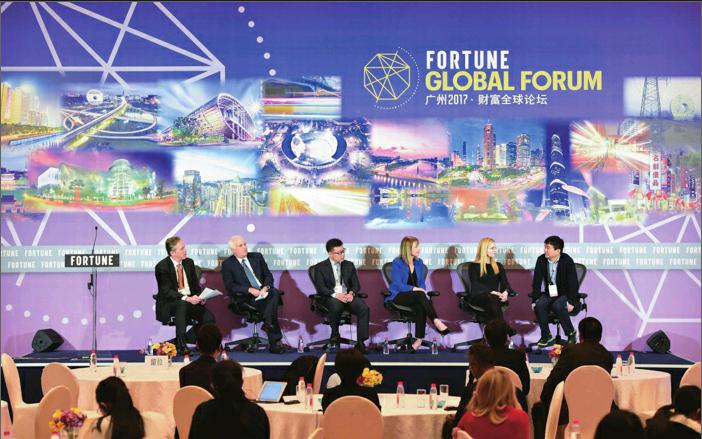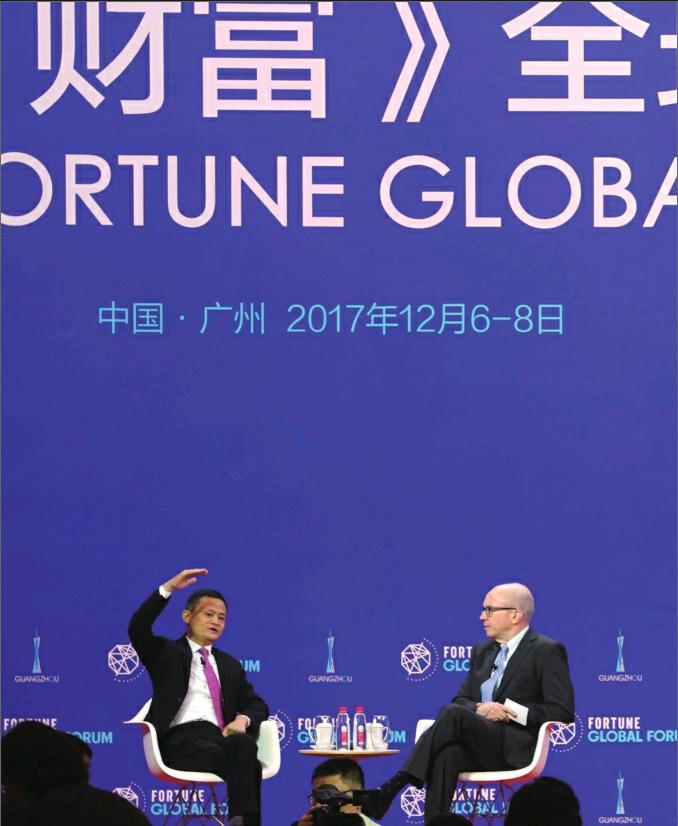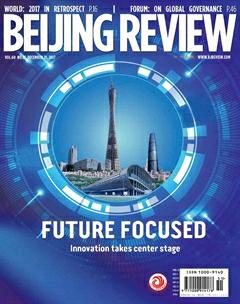THE INNOVATION REVOLUTION
By+Deng+Yaqing


Guangzhou, a millennia-old commer- cial city and once the first port in China to open to the outside world and the testing ground of Chinas market economy in the 1970s, hosted hundreds of business elites from over 30 countries and regions under one roof in early December.
With the theme Openness and Innovation: Shaping the Global Economy, the Fortune Global Forum 2017 lasted from December 6 to 8, with inclusive cooperation, sustainable development and innovation revolution proving to be the hottest topics amongst attendees.
As President Xi Jinping pointed out in his report delivered to the 19th National Congress of the Communist Party of China(CPC), innovation is the primary force driving development and the strategic underpinning for building a modernized economy.
According to Fortune magazine, the Fortune Global 500 list this year includes 115 Chinese companies, almost on par with the 132 American companies which also make the list. “There are an increasing number of areas—like mobile payments, drone development and others—where China has become not a follower, but the global technological leader,” said Alan Murray, President of Fortune magazine.
In the past, there was a widely held notion that Chinese entrepreneurs were copying their Western counterparts, but in recent years, China has demonstrated its own capacity for innovation. There are not only Internet giants, like Baidu, Alibaba and Tencent, but also a new generation of companies with group-buying website MeituanDianping, ride-hailing firm Didi Chuxing and so on, said Yahoo co-founder Jerry Yang, who believes new technologies like artificial intelligence and the divergent paths that China and the West are taking look set to make the future even more interesting.
Shaking off the reputation of “tech copycats” and blazing a new trail of their own making, Chinese enterprises have now evolved into a major provider of new technologies. “Unlike in the past, China is no longer just a factory for the world, but also makes an important contribution to global innovation,” said Yang Yuanqing, CEO of Lenovo.
New frontiers
In 2017, any conversation about the future of technology invariably places the same two words on the tip of everyones tongue: artificial intelligence. “As the use of the Internet becomes increasingly popular, intelligent devices are flooding our daily lives. In fact, Im more inclined to refer to so-called artificial intelligence as augmented intelligence, because it is designed to enhance peoples brainpower rather than replace it,” said Yang.endprint
As big data and cloud computing technologies mature, artificial intelligence is being employed in product development, manufacturing, supply, marketing and services of various industries with increasing frequency, Yang noted. For example, in the past, what a company was going to produce was decided by engineers alone in the laboratory, whilst now decisions are made based on feedback collected from users.
Another example is sales forecasting, the most difficult link in the chain of manufacturing. By analyzing past sales data, product feedback and other offline data from the market, manufacturers can more accurately predict future demand and better balance supply and demand.
To keep abreast with changing demands, sometimes a company has to relegate its own mature products which once won, or in some cases still maintain, favor within their consumer base.
When smartphones began gaining popularity, we were confronted with a brand new technological ecosystem characterized by the era of mobile Internet and had to admit the fact that our most popular personal computer communication app QQ was facing challenges, said Pony Ma, CEO of Tencent. Ma noted that in order to push the companys mobile Internet product WeChat to dominate the market, they redirected all their resources to the nascent project because it was believed to be more compatible with the new trend of Internet development.
In terms of the future development of mobile Internet technology, Ma believes challenges will come in the form of the changes to hardware, including computer chips, battery technology, wearable cameras and augmented reality. In addition, QR codes will be the key to connecting online with offline worlds, people with each other, and people with services, adding that eventually consumers will be spared from downloading and installing applications.
Reinventing tradition
Humans have always been wary of change and rapid technological innovation has often been regarded as negative. Epitomized by Schumpeters economic theory of creative destruction, social progress necessarily comes at the expense and losses of traditional industries. In other words, when new technologies prevail, old ones will suffer.
However, some entrepreneurs at the Fortune Global Forum dont see the advance of technology in this way. Zhang Lei, CEO of Hillhouse Capital Management, argued that scientific and technological innovation should be integrated with traditional industries to generate value for not only hi-tech inventors but for ordinary people as well.endprint
“Technology should be endowed with the role of rebalancing and merging with traditional industries, realizing the innovation of long-term value creation and common development,” said Zhang, who explained his investment in shoemaker Belle aimed at helping more people engaged in traditional industries benefit from technological progress.
Zhang believes technological innovation should not be just a replication of othersexperience or a simple combination of various technologies and application models, but new ways of thinking and doing things, especially in the context of the Internet.
Also attending the forum was Jack Ma, founder of the Alibaba Group, who presented his viewpoint on transforming the traditional retail industry. As e-commerce has all the data with regard to consumer demands, location and shopping frequency, by integrating online and offline, salesmen in brickand-mortar locations can better serve their customers.
“There is huge potential for traditional retail, but they have to transform their business models to embrace the technology and not be scared by innovation,” said Jack Ma.
In applying digital technologies to help entrepreneurs in traditional industries, Pony Ma observed that sectors such as finance and insurance have already found their way in the Internet world and other service industries such as travel and transportation are also advancing rapidly along the digital path with the mushrooming of a large number of brilliant innovative enterprises such as Didi Chuxing and bike-sharing firm Mobike.
The Internet is also an equally indispensable component in the construction of an advanced manufacturing industry. Now, products always have to pass through several stages before they reach the hands of consumers, while in the near future, consumption will be directly linked with manufacturing without any intermediary links. The Internet can also help enterprises in the heavy manufacturing sector, with companies such as Sany Heavy Industry straying into the service sector by renting mechanical equipment to small businesses, and even providing them with financial services, said Pony Ma.
A huge market and an atmosphere of dynamic innovation will make China the future home of many new business models. While bike sharing is taking place in a lot of countries, the concept has been fully realized in China, said Tim Cook, CEO of Apple, on the opening day of the forum. Cook paid a visit to Chinese bike-sharing company Ofo on March 21.endprint
The expansion of emerging Chinese enterprises such as Didi Chuxing and Mobike is much faster than that of startups in the United States, said Tong Shihao, managing partner of Granite Global Ventures, noting that it took Uber several years to grow into a large-scale company in the United States, but only two years for Mobike to become a 10-billion-yuan ($1.5-billion) company in China.
A new concept
In the context of the integration of global innovation, new business models created in China look set to spread to other parts of the world. Yan Hao, CEO of the Pacific Construction Group, noted that as an increasing number of Chinese enterprises set out exploring opportunities in countries along the Belt and Road routes, the sharing of experiences and mutual learning will be realized through cooperative partnerships with enterprises along the routes, so that the whole world can benefit from common development.
At the 19th CPC National Congress, President Xi pointed out that it is imperative to adhere to the principle of achieving shared growth through communication and collaboration.
Although the global economy has seen increases in terms of the volume of world trade, foreign direct investment and the number of transnational companies over the recent decades, it has suffered from development imbalance, a gap in the allocation of resources and ineffective multinational governance.
The future status of economic globalization is a question which requires an answer. China, as the worlds second largest economy, has put forward the idea of building a community with a shared future for mankind in a bid to create a world order based on the principles of rationality, equity and inclusiveness. With such a vision, economic globalization founded in shared growth and inclusiveness could still be within sight. Chinese proposals, including the building of a community with a shared future for mankind and the Belt and Road Initiative, look to steer the world in the direction of shared prosperity.endprint

